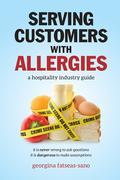Around the world the allergy epidemic is spreading. The hospitality industry can no longer bury its head in the sand and pretend allergy prone customers don't exist. But how do restaurants and all other food outlets cope with this new demand? This book is a guide to help reduce the hit and miss situations that currently exist. Books like this can never be definitive, however, they can go a long way to overcome confusion, misinformation and ignorance. The book covers 14 of the most common allergies the hospitality industry is most likely to meet. These include dairy, corn/maize gluten, latex, night shades, nuts, seafood and a lot more. Each chapter covers what people can and cannot eat, substitutes, hidden sources, and cross-over related allergies. Georgina Fatseas-Sano was a special education teacher for 12 years. She furthered her education in various short term certificate and diploma business courses. She still operates a small specialty food shop where she is constantly meeting people with multiple allergies. The shop frequently receives calls from caterers, restaurants and occasionally fast food outlets looking for assistance in dealing with people who have allergies.


